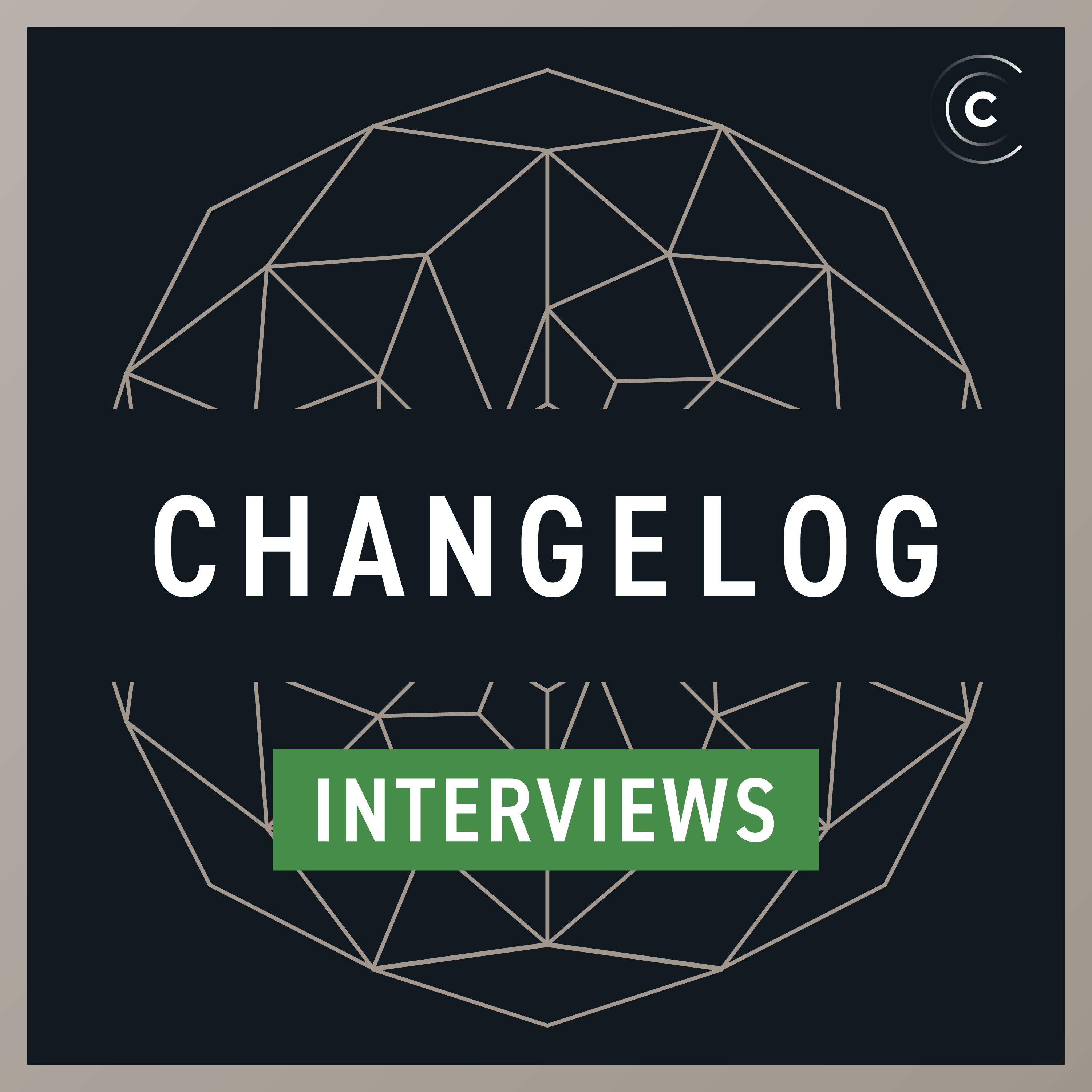Discover Changelog Master Feed
Changelog Master Feed

Changelog Master Feed
Author: Changelog Media
Subscribed: 610Played: 61,922Subscribe
Share
© All rights reserved
Description
Your one-stop shop for all Changelog podcasts. Weekly shows about software development, developer culture, open source, building startups, artificial intelligence, shipping code to production, and the people involved. Yes, we focus on the people. Everything else is an implementation detail.
1994 Episodes
Reverse
All of the health anxiety of early internet adopters traced back to WebMD’s self diagnosis. Some sysadmin’s on-call nightmares came from a different part of the site.
Annie Sexton has been on quite a journey since she was last on the show back in early ‘22. On this episode, Annie takes us on that journey, shares her new-found perspective & tells us about how she’s approaching her side project this time around.
Shoelace creator Cory LaViska joins Amal & Jess to tell them all about the forward-thinking library of web components that just joined the Font Awesome family to create Web Awesome.
Yep, you heard that right. Autonomous fighter jets are in the news. Chris and Daniel discuss a modified F-16 known as the X-62A VISTA and autonomous vehicles/ systems more generally. They also comment on the Linux Foundation’s new Open Platform for Enterprise AI.
In this week’s episode we’re talking about the news! In this laugh-filled episode, Kris is joined by Ian & Johnny to discuss the future of Go, both the Go team itself and iterations of packages within the standard library; Microsoft creating a Go blog & a Go fork; and SQLite and Go.
Paul Orlando is back to talk about his book titled “Why Now?” You may remember Paul from his last appearance (a fan favorite) talking with Jerod about complex systems & second-order effects. Paul’s book, “Why Now?” explores the concept of timing and the importance of understanding the ‘why now’ in business and product development. We discuss timing examples from the book that were either too early or too late (such as the first video phone and car phones), the need to consider both technological advancements and user demand when assessing timing, the significance of timing in the success of companies like Apple and the launch of the iPhone, Uber and Heroku, and more. Also, join our Slack community for a chance to get a signed copy of Paul’s book.
Bahaa Zidan says your web framework doesn’t matter, DHH writes about magic machines, Dylan Huang reviews thousands of opinions on HTMX, Tim Ottinger says programming is thinking & Tim Spann says small language models (SLM) for the win.
Anita Zhang is here to tell us how Meta manages millions of bare metal Linux hosts and containers. We also discuss the Twine white paper and how AI is changing their requirements.
Our friend Ron Evans is a technologist for hire, an open source developer, an author, a speaker, an iconoclast, and one of our favorite people in tech. This conversation with Ron goes everywhere: from high-altitude weather balloons, to life on Mars, to Zeno’s paradox applied to ML, to what open source devs should learn from the Wu-Tang Clan & more.
Brian LeRoux joins Jerod to share how the Enhance team are bringing server side rendered web components to everyone. With Enhance WASM, you author components in friendly, standards based syntax and reuse them across multiple languages, frameworks & servers.
This week we’re joined by Dustin Bluck to discuss his acquisition of the well known (and beloved) Castro podcast app to take it indie-focused once again. As previous users of Castro, we were excited to dig into the details behind this popular podcast client to see what’s next, how the deal was done, a peek into the code, and where exactly this indie and creator focused podcast app can go.
What makes a good, bad, and truly great workshop? How do you put together a Go workshop that works, and how do you get the most out of workshops you attend?
We recently gathered some Practical AI listeners for a live webinar with Danny from LibreChat to discuss the future of private, open source chat UIs. During the discussion we hear about the motivations behind LibreChat, why enterprise users are hosting their own chat UIs, and how Danny (and the LibreChat community) is creating amazing features (like RAG and plugins).
Daniel Hooper lists out all the good ideas in computer science, Jeff Geerling declares 2024 the year corporate open source dies, Jared Turner says all kinds of works-in-progress are waste, Daroc Alden covers the leadership crisis in the Nix community & John Hawthorn explains why Ruby may be faster than you think.
In this episode Justin and Autumn are joined by Mandi Walls to take you back to a time before the cloud. Before Kubernetes. When a/s/l was common and servers were made of metal. Back to the days of AOL to discuss how chat rooms worked.
Frequent guest (and almost real-life-friend) Adam Jacob returns to share his spicy takes on all the recent “open source meets business” drama. We also take some time to catch up on the state of his open source-based business, System Initiative.
Ryan Carniato joins Amal & Nick to discuss Solid with a major focus on Signals, which are the cornerstone of reactivity in Solid.
First there was Mamba… now there is Jamba from AI21. This is a model that combines the best non-transformer goodness of Mamba with good ‘ol attention layers. This results in a highly performant and efficient model that AI21 has open sourced! We hear all about it (along with a variety of other LLM things) from AI21’s co-founder Yoav.
This week we’re joined by Louis Pilfold, the creator of the Gleam programming language. For the uninitiated, Gleam is a functional programming language for building type-safe systems that compiles to Erlang and JavaScript and it’s written in Rust. We discuss the inspiration and development of Gleam, how it compares to other languages, where it shines, the overwhelming amount of support Louis is getting through GitHub sponsors, what’s next for Gleam and their near-term plans for a language server.
The 3 Musketeers return! Filippo Valsorda, Roland Shoemaker & Nicola Murino continue their deep-dive conversation with Natalie about Go’s crypto libraries. Also listen to Part 1 and Part 2!











